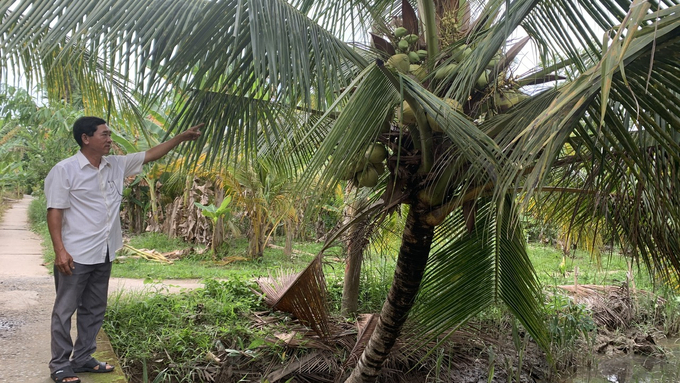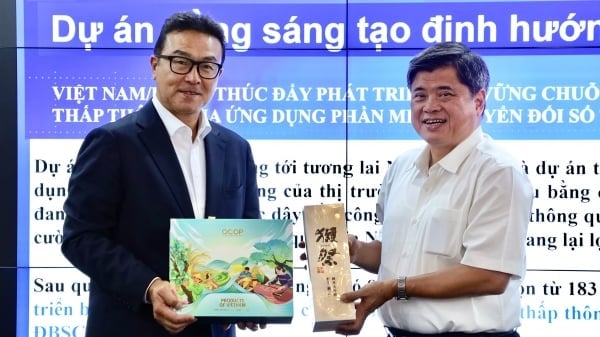May 25, 2025 | 04:24 GMT +7
May 25, 2025 | 04:24 GMT +7
Hotline: 0913.378.918
May 25, 2025 | 04:24 GMT +7
Hotline: 0913.378.918

The coconut planting area in Tra Vinh province is ranked second in the country, only bedind Ben Tre. Photo: Ho Thao.
The unit was considering the approval for the implementation of scientific and technological tasks on "Building map on space distribution, carbon evaluation, and Co2 absorb capabilities on coconut biomass of Tra Vinh province" on July 26, according to Tran Van Ut, Deputy Director of the Department of Science and Technology of Tra Vinh province. This initiative gradually leads to the industry's participation in the carbon market.
Tam reports that recent research conducted by Can Tho University indicates that a single hectare of coconut trees that are 10 years old can absorb approximately 70-75 tons of CO2.
The coconut industry can generate substantial revenues from the sale of carbon credits in the future if the price is comparable to that of forest carbon credits (5 USD per ton of CO2).
Mr. Tam reports that Tra Vinh currently boasts the second-largest coconut area in the nation, following Ben Tre, with an annual output of approximately 444 million fruits and 27,390 hectares. The coconut industry's participation in the carbon market will enhance the quality of life for rural residents and generate additional income.
The Provincial People's Committee has been upgrading the value chain for many years by implementing coconut, which is one of the important crops of the locality, according to the Deputy Director of the Department of Science and Technology of Tra Vinh province.
The province conducts investment promotion and development activities on a regular basis to foster and strengthen relationships between businesses and coconut agricultural households. This is aimed at ensuring that the production, processing, and consumption of products meet international standards and are suitable for the export market.
Translated by Linh Linh

(VAN) On May 23, Deputy Minister of Agriculture and Environment Tran Thanh Nam held a working session with a Japanese delegation on the application of digital technology in agricultural production.

(VAN) In the tranquil wetlands of Van Long, there are quiet souls who guard the forests, nurture the waters, and oversee every bird and troop of langurs as protecting the essence of a living heritage.

(VAN) WWF, GIZ, IUCN, UNDP call for biodiversity conservation and sustainable development must be regarded as a unity in strategies for a green future.

(VAN) On celebration of International Day for Biological Diversity, Deputy Minister Nguyen Quoc Tri called for practical actions to address nature and biodiversity conservation.

(VAN) Dr. Hoang Thi Thanh Nhan – Deputy Director of the Nature and Biodiversity Conservation Agency – highlighted this on the International Day for Biological Diversity, May 22, 2025.
![Ho Chi Minh city adapts to climate change: [2] Accelerating action](https://t.ex-cdn.com/nongnghiepmoitruong.vn/608w/files/chiqk/2025/05/22/4024-4220-bien-doi-khi-hau-1-100626_766.jpg)
(VAN) Clearly recognizing the challenges posed by climate change, Ho Chi Minh city has swiftly shaped its policies and implemented practical solutions to adapt.

(VAN) Rice straw is no longer just a discarded byproduct, but it is becoming a green resource that helps farmers in the Mekong Delta reduce emissions and promote circular, sustainable agriculture.